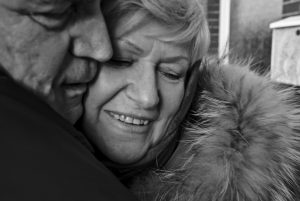Over the course of this class we have read and seen many examples of how different people relate to death. That being said, there has always been a sort of unspoken rule that discussing death should always be done in a respectful and mature way. What happens when that is completely turned on its head?
The musical Fun Home has a lot of layers to discuss. It follows the true life story of Alison Bechdel, an American cartoonist who grew up in her father’s funeral home. The musical goes on to follow Alison discovering her sexuality, dealing with her closeted gay father’s infidelity to her mother, and ultimately her father’s apparent suicide. There is a lot to unpack there. However, one of the most striking moments for me, the moment that really turns all expectations on its head, is the song “Come to The Fun Home.” This song is the imaginary advertisement child age Alison and her siblings try to make for their family’s funeral home.
When you witness children running across stage, singing a happy and childlike melody, but having the lyrics “You’ve got to bury your mama / But you don’t know where to go” or “Our caskets (ooo) / Are satin-lined (ooo)” you cannot help but laugh. This humor comes from the inherent disconnect between children playing around and a song about funeral home practices. The catchy little rhymes continue as they mention that the Bechdel Funeral Home has folding chairs, smelling salts, ample parking, and more. It goes so drastically against our perceptions of a funeral home and those who work there that it is hard to even frame them in the same mental image. The fact is we think of funeral homes as somber locations and playing children are practically the symbol of life.
Now why else is this so shocking? For one our western society has the tendency to try to hide or diminish death from young children, not let them play sword fight with aneurysm hooks. This openness with death with those so young immediately sets off alarm bells. Also there is a lack of reverence to death within the lyrics, the staging (the kids playing on a casket), and the melody that completely disorients our normal perception of the processes and rituals surrounding death. All of this leaves the audience hysterically stunned. What I believe the general public should take from this moment within the play Fun Home is the reminder that death is not inherently somber. Our relationship with death is entirely a societal convention and while it is not necessarily bad to be conditioned in such a way, it is important to recognize that it is there.
Watching Fun Home was one of the most powerful theatre experiences I’ve had in recent years and I highly recommend either seeing the show, reading the graphic novel it was based on, or listening to the soundtrack if anyone is interested. Keep your eye out for this particular scene and see if it challenges how you view death.





